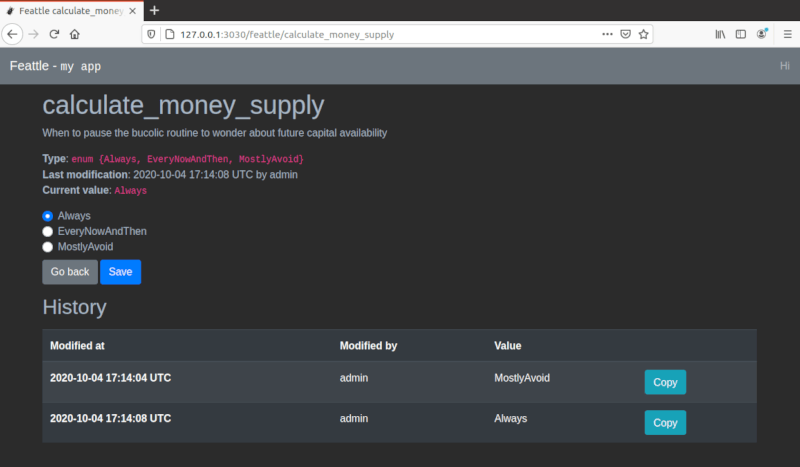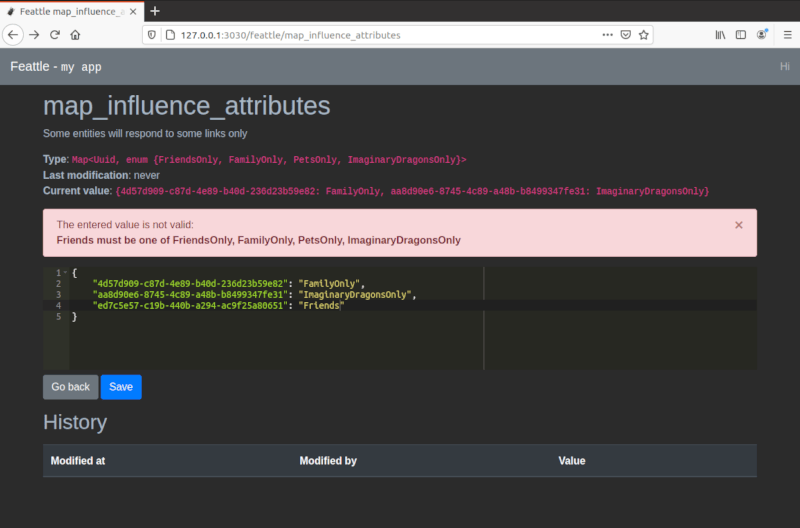15 releases (4 stable)
| 4.0.0 | May 6, 2025 |
|---|---|
| 3.0.0 | Mar 13, 2025 |
| 2.0.0 | Jun 26, 2024 |
| 1.0.0 | Jun 28, 2023 |
| 0.2.5 | Oct 23, 2020 |
#37 in Configuration
1,327 downloads per month
175KB
3K
SLoC
feattle
Featture toggles for Rust (called "feattles", for short), extensible and with background synchronization and administration UI.
Features
- Feature toggles that synchronize automatically with a backing storage
- Feature toggles can be as simple
bool, but can also be lists, maps and arbitrary tpes ( (through theFeattleValuetrait). - Web UI with documentation, change history, validation
- JSON API to read and set the toggles
- Modular and extensible: use as much or as little of the bundled features as you want. Want to use a different Web UI? A different storage layer? No problem.
Example
use feattle::*;
use std::sync::Arc;
/// A struct with your feature toggles: you can use primitive types (like `bool`, `i32`, etc),
/// standard collections (like `Vec`, `BTreeSet`, etc) or any arbitrary type that implements
/// the required trait.
feattles! {
struct MyFeattles {
/// Is this usage considered cool?
is_cool: bool = true,
/// Limit the number of "blings" available.
/// This will not change the number of "blengs", though!
max_blings: i32,
/// List the actions that should not be available
blocked_actions: Vec<String>,
}
}
#[tokio::main]
async fn main() {
// Store their values and history in AWS' S3
use std::future::IntoFuture;
use std::time::Duration;
use tokio::net::TcpListener;
let config = aws_config::load_from_env().await;
let persistence = Arc::new(S3::new(
&config,
"my-bucket".to_owned(),
"some/s3/prefix/".to_owned(),
));
// Create a new instance
let my_feattles = Arc::new(MyFeattles::new(persistence));
// Poll the storage in the background
BackgroundSync::new(&my_feattles).start().await;
// Start the admin UI with `warp`
let admin_panel = Arc::new(AdminPanel::new(my_feattles.clone(), "Project Panda - DEV".to_owned()));
tokio::spawn(run_warp_server(admin_panel.clone(), ([127, 0, 0, 1], 3030)));
// Or serve the admin panel with `axum`
let router = axum_router(admin_panel);
let listener = TcpListener::bind(("127.0.0.1", 3031)).await.unwrap();
tokio::spawn(axum::serve(listener, router.into_make_service()).into_future());
// Read values (note the use of `*`)
assert_eq!(*my_feattles.is_cool(), true);
assert_eq!(*my_feattles.max_blings(), 0);
assert_eq!(*my_feattles.blocked_actions(), Vec::<String>::new());
}
You can run a full example locally with: cargo run --example full --features='s3 uuid warp axum'.
With this code, you'll get an Web Admin UI like:

You can use the UI to edit the current values and see their change history. For example, this
is what you can expect when editing an enum:

It also supports complex types with a JSON editor and helpful error diagnostics:

How it works
The macro will generate a struct with the given name and visibility modifier (assuming private
by default). The generated struct implements Feattles and also exposes one method for each
feattle.
The methods created for each feattle allow reading their current value. For example, for a
feattle is_cool: bool, there will be a method like
pub fn is_cool(&self) -> MappedRwLockReadGuard<bool>. Note the use of
parking_lot::MappedRwLockReadGuard because the interior of the struct is stored behind a RwLock to
control concurrent access.
A feattle is created with the syntax $key: $type [= $default]. You can use doc coments (
starting with ///) to describe nicely what they do in your system. You can use any type that
implements FeattleValue and optionally provide a default. If not provided, the default
will be created with Default::default().
Minimum supported Rust version
As of this release, the MSRV is 1.82.0, as tested in the CI. A patch release will never require a newer MSRV.
Optional features
You can easily declare feattles with your custom types, use another persistance storage logic or Web Framework (or any at all). For some out-of-the-box functionality, you can activate these cargo features:
- uuid: will add support for
uuid::Uuid. - rusoto_s3: provides
RusotoS3to integrate with AWS' S3 - aws_sdk_s3: provides [
S3] to integrate with AWS' S3 - warp: provides
run_warp_serverfor a read-to-use integration withwarp - axum: provides
axum_routerfor a read-to-use integration withaxum
Crate's organization
This crate is a simple re-export of these three components:
Having them separate allows for leaner lower-level integration. If you're creating a crate to
provide a different storage or admin, you just need feattle-core.
License
Licensed under either of
- Apache License, Version 2.0 (LICENSE-APACHE or http://www.apache.org/licenses/LICENSE-2.0)
- MIT license (LICENSE-MIT or http://opensource.org/licenses/MIT)
at your option.
Contribution
Unless you explicitly state otherwise, any contribution intentionally submitted for inclusion in the work by you, as defined in the Apache-2.0 license, shall be dual licensed as above, without any additional terms or conditions.
See CONTRIBUTING.md.
Dependencies
~7–23MB
~311K SLoC